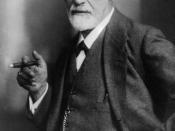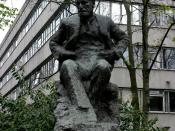Jon Hoover
4/30/07
RWS200
Gabe Jones
Turkle: Social formation in Cyberspace
Turkle argues that the Internet is a place in which we can build different identities than the ones that we are stuck with in RL, or "real life". Of course, we all know about the dangers of doing this at times as children are stalked by pedophiles pretending to be caring and safe adults. But Turkle reminds us that there are a number of advantages to being able to shift identities when one goes on line. The man who was once a boy tormented by his rural classmates for being a fag because he liked to read now finds himself in a group of people who think that his vast knowledge of Nero Wolfe is totally cool. Although, as we advance we will inevitably face new and more challenging phenomenon, the latest being the internet and it's strange ability to change the age old process of becoming a unique individual.
The creation of an individual's identity is marked by many factors that mold them throughout their lifetime, starting before they are born. The debate of nature versus nurture has fueled the exploration of identity in psychology. Even though many people theorized about genetic determination of one's attributes, lack of technology in the early twentieth century seemed to be the end of genetic argument. At this point in time Sigmund Freud, an Austrian neurologist, came up with a conclusion for the identity argument. He said that identity is centralized and unitary, and if anyone felt otherwise then they were suppressing an uncomfortable unconscious urge, most likely a sexual fantasy. Freud's hypothesis was lacking scientific evidence, but because it had "down to earth ideas" and "tangible" objects or ideas to play with, such as dreams and slips of tongue, it was...


